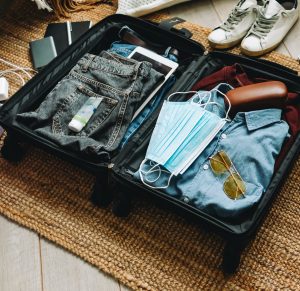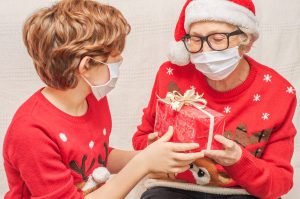Celebrate upcoming holidays, but be safe
November 18, 2021
The CDC is still recommending smaller indoor gatherings for this year and to arrange seating to allow for physical distance.
As we head into the holiday season, the Illinois Department of Public Health (IDPH) is issuing updated guidance to help people celebrate more safely as we continue to battle the COVID-19 pandemic.
“Last year, many people held off getting together with family and friends during the holiday season due to the pandemic,” said IDPH Director Dr. Ngozi Ezike. “This year, we have a safe and effective vaccine to help protect against severe illness due to COVID-19 that will allow friends and families to more safely celebrate together. Getting vaccinated is the best way to protect yourself, your friends and family, and your community, but there are other actions you can take to celebrate more safely.”
Holiday traditions are important for families and children. There are several ways to enjoy holiday traditions and protect your health.
Because many generations tend to gather to celebrate holidays, the best way to minimize COVID-19 risk and keep your family and friends safer is to get vaccinated if you’re eligible.
Even with the federal government reporting that more than 70 percent of adults in the country fully vaccinated against COVID-19, health officials are still suggesting caution when observing the holidays.
Here are safer ways provided by the IDPH and the Centers for Disease Control and Prevention to celebrate:
Generally:
- Outdoors is safer than indoors.
- Avoid crowded, poorly ventilated spaces.
- If you are sick or have symptoms, don’t host or attend a gathering.
- Get tested if you have symptoms of COVID-19 or have a close contact with someone who has COVID-19.
- Keep indoor gatherings small
- Arrange seating and other areas to allow for physical distance
- Increase air flow by opening windows and/or doors
- Avoid having people congregate, such as in the kitchen or at the buffet
- Clean and sanitize the kitchen, bathrooms, and other areas used by guests
- Protect those not yet eligible for vaccination such as young children by getting yourself and other eligible people around them vaccinated.
- Wear well-fitting masks over your nose and mouth if you are in public indoor settings if you are not fully vaccinated.
- Even those who are fully vaccinated should wear a mask in public indoor settings in communities with substantial to high transmission.

Everyone, even people who are fully vaccinated, is required to wear a mask on public transportation and follow travel recommendations. Be aware of local COVID-19 guidelines when crossing state lines.
Travel
- Delay travel until you are fully vaccinated, or wait until you get a booster shot if eligible
- If you’re not fully vaccinated, test 1-3 days before and 3-5 days after traveling
- Travel during off-peak times to avoid crowds
- Drive a private vehicle to reduce exposure to COVID-19
- If using public transportation, try to travel during non-peak times. Masks are required on/in all areas of mass transit.
- If you are not fully vaccinated and must travel, follow CDC’s domestic travel or international travel recommendations for unvaccinated people.
Special considerations:
People who have a condition or are taking medications that weaken their immune system may not be fully protected even if they are fully vaccinated and have received an additional dose. They should continue to take all precautions recommended for unvaccinated people, including wearing a well-fitted mask, until advised otherwise by their healthcare provider.
You might choose to wear a mask regardless of the level of transmission if a member of your household has a weakened immune system, is at increased risk for severe disease, or is unvaccinated.
If you are gathering with a group of people from multiple households and potentially from different parts of the country, you could consider additional precautions (e.g., avoiding crowded indoor spaces before travel, taking a test) in advance of gathering to further reduce risk.
Do not put a mask on children younger than 2 years old.
More information on COVID-19 Holiday Season Safety can be found on the IDPH website at https://dph.illinois.gov/covid19/community-guidance/holiday-season-safety.html
Planning/attending gatherings
If you are attending a gathering, think about the steps you need to take to protect yourself and your loved ones from COVID-19.
- If you are not fully vaccinated and aged 2 or older, you should wear a mask in indoor public places.
- In general, you do not need to wear a mask in outdoor settings.
- In areas with high numbers of COVID-19 cases, consider wearing a mask in crowded outdoor settings and for activities with close contact with others who are not fully vaccinated.
- People who have a condition or are taking medications that weaken their immune system may not be fully protected even if they are fully vaccinated. They should continue to take all precautions recommended for unvaccinated people, including wearing a well-fitted mask, until advised otherwise by their healthcare provider.
- If you are fully vaccinated, to maximize protection from the Delta variant and prevent possibly spreading it to others, wear a mask indoors in public if you are in an area of substantial or high transmission.
- If you are fully vaccinated, see how to protect your family if you have members who are vaccinated and unvaccinated.

You might choose to wear a mask regardless of the level of transmission if a member of your household has a weakened immune system. Those with such conditions should continue to take all precautions.
Gathering virtually or with the people you live with is the safest choice.
- Have a virtual gathering, like a virtual party, concert or sporting event with friends and family.
- If you do gather with people who don’t live with you, gatherings and activities held outdoors are safer than indoor gatherings.
- Avoid crowded, poorly ventilated spaces.
- Know what to do if your family has members who are vaccinated and unvaccinated.
Know public safety measures in place at the venue.
- Check with the organizer or event venue for updated information about any COVID-19 safety guidelines.
- Choose events that take place outside with enough space for attendees to stay at least 6 feet apart.
What to do if You Become Sick after Attending a Gathering
- Attending a large gathering or event increases your chance of being in close contact with people outside your household and being exposed to COVID-19.
- People who have come into close contact with someone with COVID-19 should be tested to check for infection:
- Fully vaccinated people should be tested 5–7 days after their last exposure.
- People who are not fully vaccinated should get tested immediately when they find out they are a close contact. If their test result is negative, they should get tested again 5–7 days after their last exposure or immediately if symptoms develop.
- Know when to quarantine.
Get the flu shot
The flu vaccination is the best way to prevent flu and its potentially serious complications.
- Flu vaccines prevent millions of illnesses, tens of thousands of hospitalizations and thousands of deaths every season.
- Flu vaccines are safe. Hundreds of millions of flu vaccines have been safely given to Americans for more than 50 years.
- Getting vaccinated yourself may also protect people around you, including those who are more vulnerable to serious flu illness, like babies and young children, older people, and people with certain chronic health conditions.
- While some people who get vaccinated do still get sick, there is a growing amount of data showing that vaccination makes illness less severe, helping to prevent serious outcomes.
(SOURCES: Illinois Department of Public Health and the Centers for Disease Control and Prevention)






